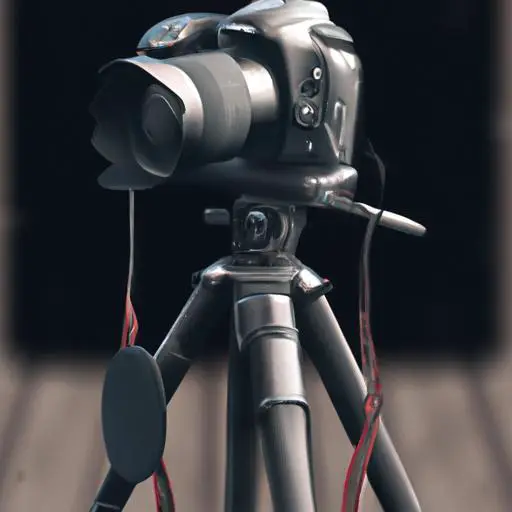Are you looking to expand the capabilities of your photography? If you are a Nikon user, you may be wondering if you can use Canon lenses on your camera.
The good news is that it is possible, and in this article, well cover what you need to know to make the switch.
Well look at the background of Canon and Nikon cameras, the use of an adapter, the advantages and disadvantages of using an adapter, compatibility issues, autofocus, and image stabilization.
Read on to find out more about how to use Canon lenses on Nikon cameras.
Table of Contents
Short Answer
No, you cannot use a Canon lens on a Nikon camera.
Canon and Nikon use different lens mounts, so a Canon lens will not physically fit on a Nikon camera body.
There are some third-party adapters that allow you to use Canon lenses on Nikon cameras, however the compatibility and functionality of these adapters can vary.
Background on Canon and Nikon Cameras
When it comes to digital cameras, Canon and Nikon are two of the most well-known and respected manufacturers.
Both Canon and Nikon offer a variety of digital cameras, ranging from entry-level point-and-shoot models to professional-grade DSLRs.
Canon cameras are typically known for their excellent image quality and user-friendly features, while Nikon cameras are renowned for their durability and professional-grade features.
While both brands offer a variety of options, there are some key differences between the two that make them incompatible with each other.
The most obvious difference between Canon and Nikon cameras is the lens mount.
Canon cameras use the EF lens mount, while Nikon cameras use the F-mount.
In addition to the lens mount, Canon and Nikon cameras also use different autofocus systems, which means that lenses designed for one camera may not work with the other.
Furthermore, the different autofocus systems mean that lenses designed for Canon cameras may not be able to autofocus on Nikon cameras, and vice versa.
Finally, some lenses require an electronic communication between the lens and the camera body in order to work, and this is something that is not shared between Canon and Nikon cameras.
What Is An Adapter?

An adapter is a tool used to make two different components work together that would not ordinarily be compatible.
In the case of camera lenses, an adapter is a device that is used to fit a lens with one type of mount on a camera body with a different type of mount.
For example, if you have a Canon lens and a Nikon camera, you would need an adapter to be able to securely attach the Canon lens to the Nikon camera body.
Adapters come in all shapes and sizes and are typically made out of metal, plastic, or some combination of the two.
They can be as simple as a ring with a hole in the middle and some sort of locking mechanism, or they can be more complex, with additional features such as electronic communication between the camera and the lens.
Depending on the type of adapter used, you may be able to use all of the features your lens has to offer, or you may be limited in what you can do.
When using an adapter, it is important to make sure that the mount on the lens and the mount on the camera body are compatible.
Some adapters are designed to fit one type of mount on a lens and another type of mount on a camera body, while other adapters are designed to fit two different mounts on the same type of lens.
It is important to make sure that you are using the correct adapter for your camera and lens combination.
Additionally, some adapters may require additional components, such as a focusing ring or an electronic connection, to be able to use the lenss features.
Overall, adapters are an invaluable tool when it comes to using lenses with different mounts on the same camera body.
However, it is important to understand the limitations of using an adapter, and to make sure that you have the correct adapter for your lens and camera combination.
Advantages of Using an Adapter
Using an adapter to mount Canon lenses on Nikon cameras has its advantages.
First and foremost, it is an affordable solution for photographers who want to use a Canon lens, but dont want to invest in a Canon camera body.
Another benefit of using an adapter is that it allows photographers to use lenses from a variety of brands, including third-party lenses, on their camera.
This gives photographers the flexibility to use any lens they want, regardless of the brand.
Additionally, some adapters allow photographers to use specialty lenses, such as tilt-shift lenses, on their camera, which can be difficult to find in the correct mount.
Finally, adapters provide a way to use vintage lenses on modern cameras, which can be a great way to add a unique look to your photos.
Disadvantages of Using an Adapter

Using an adapter to fit a Canon lens onto a Nikon camera body may seem like an ideal solution, but it comes with a few potential drawbacks.
First, since the lens and camera bodies are not designed to work together, some features may be unavailable.
Autofocus, for example, may not work, and manual focus may be difficult and time-consuming.
Additionally, any lens that relies on electronic communication between the lens and the camera body, such as image stabilization, will likely not work.
This means that you may have to hand-hold the camera for any long exposures, which can be difficult.
Furthermore, some adapters may not be compatible with certain lenses, so it is important to do your research and make sure that the adapter you purchase is compatible with your equipment.
Finally, adapters can be expensive, so you should make sure that it is worth the cost in terms of the quality of the images you can get.
Compatibility Issues with Adapters
When it comes to using Canon lenses on Nikon cameras, the biggest issue is compatibility.
Since Canon and Nikon cameras use different lens mounts, an adapter must be used to fit the Canon lens onto the Nikon body.
While these adapters are widely available, they can cause some compatibility issues that can make autofocus and other features unavailable.
Additionally, any lens that requires electronic communication between the lens and the camera body, such as image stabilization, will not work with the adapter.
Furthermore, when using an adapter, it is important to use a good quality adapter that is designed specifically for the lens and camera model you are using.
Some adapters may be cheaply made and cause issues with the connection between the lens and camera.
Additionally, some adapters may not be compatible with certain lenses or cameras.
Therefore, it is important to do your research and make sure the adapter you are using is compatible with both the lens and camera.
Finally, when using an adapter, it is important to make sure the lens is properly secured to the camera.
If the lens is not properly secured, it can cause issues with the connection between the lens and camera, as well as cause damage to the lens or camera.
Therefore, make sure the lens is properly secured and that the connection between the lens and camera is tight and secure before using it.
Autofocus and Other Features

Using an adapter to mount a Canon lens to a Nikon camera body can introduce some compatibility issues that render certain features unavailable.
Autofocus is one of the most commonly affected features, with the camera body being unable to detect the lens and thus being unable to send the necessary signals to the lens to achieve focus.
Similarly, any lens that requires electronic communication between the lens and the camera body, such as image stabilization, will not work if the lens is mounted on a different brand camera body.
In some cases, the lens may even be unable to close the shutter or achieve focus at all, making it impossible to take a picture.
It is important to note that these compatibility issues are not exclusive to Canon lenses on Nikon camera bodies; using lenses from any other brand on a camera body from a different brand will likely cause the same issues.
Additionally, the compatibility issues may vary depending on the adapter used; some adapters are more reliable than others, so it is important to do your research before purchasing one.
Ultimately, it is possible to use Canon lenses on Nikon cameras, but it is important to understand the limitations.
Image Stabilization
Using a Canon lens on a Nikon camera can cause compatibility issues, including the inability to use image stabilization.
Image stabilization is a feature that helps reduce camera shake and blur in photos.
It is typically found in lenses, but some cameras also have built-in image stabilization.
When using a Canon lens on a Nikon camera, however, image stabilization will not work.
This is because image stabilization requires electronic communication between the lens and the camera body, and the different lens mounts of Canon and Nikon cameras prevent this from happening.
The lack of image stabilization can be particularly problematic for those shooting in low-light conditions or with longer lenses, as camera shake is more likely to occur in these scenarios.
To help prevent camera shake and blur, photographers should use a tripod or monopod, or increase their shutter speed.
Additionally, they should use a lens with a wider maximum aperture, as this will allow more light to enter the camera, allowing for faster shutter speeds.
Ultimately, while it is possible to use Canon lenses on Nikon cameras, it is important to understand the limitations, including the fact that image stabilization will not work.
By knowing what features are available and what features are not, photographers can better decide if using a Canon lens on a Nikon camera is the right choice for them.
Final Thoughts
Canon and Nikon lenses have traditionally been incompatible, however, it is possible to use Canon lenses on Nikon cameras by using an adapter.
Although adapters can provide some advantages, such as the ability to use a wider range of lenses, they can also cause compatibility issues that could prevent the use of some features.
Therefore, it is important to understand the limitations before attempting to use a Canon lens on a Nikon camera.
With the right information, you can make an informed decision about whether or not to use an adapter, and enjoy the benefits of using lenses from both camera brands.

